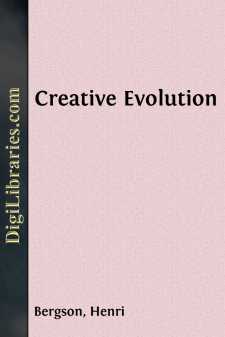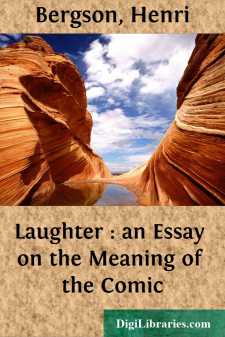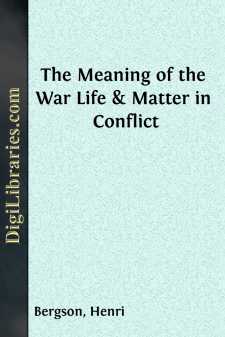Categories
- Antiques & Collectibles 13
- Architecture 36
- Art 48
- Bibles 22
- Biography & Autobiography 813
- Body, Mind & Spirit 142
- Business & Economics 28
- Children's Books 17
- Children's Fiction 14
- Computers 4
- Cooking 94
- Crafts & Hobbies 4
- Drama 346
- Education 46
- Family & Relationships 57
- Fiction 11829
- Games 19
- Gardening 17
- Health & Fitness 34
- History 1377
- House & Home 1
- Humor 147
- Juvenile Fiction 1873
- Juvenile Nonfiction 202
- Language Arts & Disciplines 88
- Law 16
- Literary Collections 686
- Literary Criticism 179
- Mathematics 13
- Medical 41
- Music 40
- Nature 179
- Non-Classifiable 1768
- Performing Arts 7
- Periodicals 1453
- Philosophy 64
- Photography 2
- Poetry 896
- Political Science 203
- Psychology 42
- Reference 154
- Religion 513
- Science 126
- Self-Help 84
- Social Science 81
- Sports & Recreation 34
- Study Aids 3
- Technology & Engineering 59
- Transportation 23
- Travel 463
- True Crime 29
Henri Bergson
Henri Bergson (1859–1941) was a prominent French philosopher and writer, known for his influential ideas on time, consciousness, and metaphysics. He was awarded the Nobel Prize in Literature in 1927 for his innovative writing and ideas, particularly evident in works like "Time and Free Will" and "Creative Evolution." Bergson's philosophy emphasized intuition over analytical reasoning, exploring the concept of "élan vital", a vital force driving life and creativity. His ideas had a significant impact on literature, philosophy, and even early 20th-century psychology.
Author's Books:
Sort by:
by:
Henri Bergson
Before the dawn of history mankind was engaged in the study of dreaming. The wise man among the ancients was preëminently the interpreter of dreams. The ability to interpret successfully or plausibly was the quickest road to royal favor, as Joseph and Daniel found it to be; failure to give satisfaction in this respect led to banishment from court or death. When a scholar laboriously translates a...
more...
by:
Henri Bergson
INTRODUCTION The history of the evolution of life, incomplete as it yet is, already reveals to us how the intellect has been formed, by an uninterrupted progress, along a line which ascends through the vertebrate series up to man. It shows us in the faculty of understanding an appendage of the faculty of acting, a more and more precise, more and more complex and supple adaptation of the consciousness...
more...
by:
Henri Bergson
CHAPTER I THE COMIC IN GENERAL—THE COMIC ELEMENT IN FORMS AND MOVEMENTS—EXPANSIVE FORCE OF THE COMIC. What does laughter mean? What is the basal element in the laughable? What common ground can we find between the grimace of a merry-andrew, a play upon words, an equivocal situation in a burlesque and a scene of high comedy? What method of distillation will yield us invariably the same essence from...
more...
by:
Henri Bergson
LIFE AND MATTER AT WAR "Comprendre et ne pas s'indigner": this has been said to be the last word of philosophy. I believe none of it; and, had I to choose, I should much prefer, when in presence of crime, to give my indignation rein and not to understand. Happily, the choice has not to be made. On the contrary, there are forms of anger which, by a thorough comprehension of their objects,...
more...





